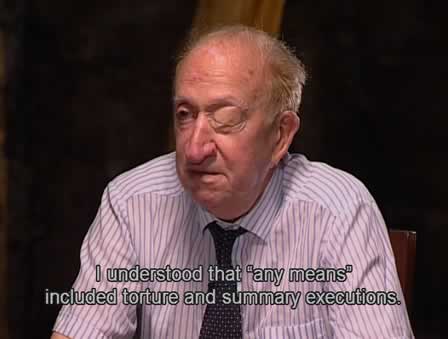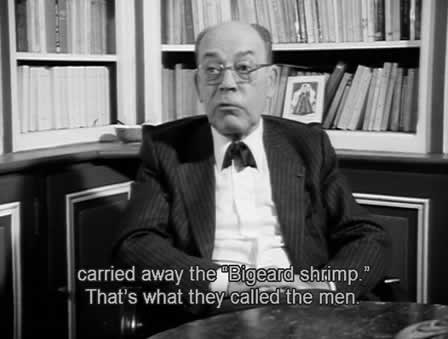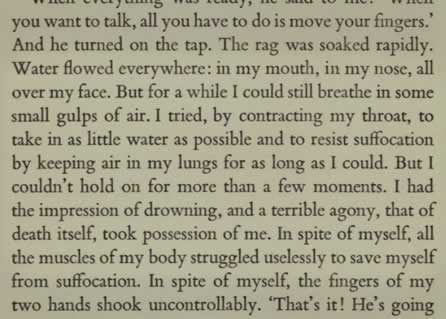Little bits and pieces of reality just seem to continue to confirm my sad conclusion that national security issues in this country are the province of people who are not too bright. at best.
 In 2000, former colonel Paul Aussaresses talked more-or-less openly about his role in assassinations and torture during the Algerian War. |
The 3-DVD set of Gillo Pontecorvo’s The Battle of Algiers from The Criterion Collection includes a number of interesting extras that total more than four hours worth of material.
 Secretary-General of the Police, Paul Teitgen recounts the name (after General Marcel Bigeard) given to the countless bodies dumped at sea by the authorities. Teitgen had ordered that all arrests were to be recorded. Comparisons of records to prisoner rolls showed that more than 3,000 of 24,000 men taken into custody had “disappeared” in a year, which prompted Teitgen to resign. |
Twenty-five minutes of that, though, is a disheartening discussion on the film and terrorism tactics between ABC News’ Christopher Isham, former State Department counterterrorism coordinator Michael Sheehan, and former NSA counterterrorism coordinator Richard Clarke (the latter two are directors of Good Harbor Consulting). I say disheartening, because both of them seem to have entirely missed one of the most important and obvious points of the film and the real story of the Algerian War.
 Journalist Henri Alleg was arrested and tortured, then held in prison camps. His account of his torture was smuggled out of the country and released in France as a book entitled The Question |
First, let’s start with the missed facts. In real life as well as in the movie, the FLN guerilla group in Algiers targeted soldiers and police until elements of the police and French civilian population started bombing apartment buildings in the Casbah section of the city. The FLN responds by planting bombs in restaurants and other civilian targets in the European sector. In the movie, the FLN leaders are shown preventing a mob from taking to the streets and being massacred by French police after the Casbah bombings by promising to avenge the dozens of deaths. Clarke and his friends elide the French bombings to use the film as an example of how terrorists attack civilians in an attempt to provoke a heavy-handed reprisal that will push the population over to their side. Maybe the story of the angry mob responding to an attack is false, but if it’s not, then Clarke seems to have slipped a cog.
Much of the discussion between the three men focuses on the topic of how best to deal — both militarily and politically — with a terrorist insurgency. How do you tamp it down? How do you eradicate the leaders and defang the movement? How do you make the population love you and not the terrorists? Many words were bloviated but one very simple method was never referenced or even hinted at: stop oppressing the population. Stop torturing them. Stop massacring them. Stop handing a group of guerillas an enormous gift of all the reasons you suck. But no, Clarke and Sheehan never take on the question of whether you should be operating as a colonial occupier in the country in the first place.